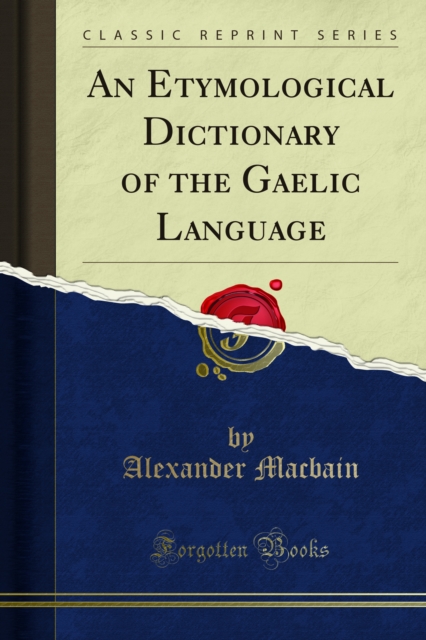
An Etymological Dictionary of the Gaelic Language PDF
by Alexander Macbain
Description
Whilst the greatest effort has been made to ensure the quality of this text, due to the historical nature of this content, in some rare cases there may be minor issues with legibility.
If you are a reader who loves learning about language and the meaning and origin of words, then <i>An Etymological Dictionary of the Gaelic Language</i> will delight your senses.This book was the first etymological dictionary of Gaelic, and in the Preface, Alexander Macbain writes that his dictionary is the purest distillation of Scottish Gaelic, purged of all the Irish words which found their way into the lexicon. <br><br>The dictionary, which contains 6,900 words, is a thorough summary of Scottish Gaelic.
Over two-thirds of the words derive from native Gaelic or Celtic, with around 20 percent of the words borrowed from other languages.
The dictionary breaks down this information so that it is easy to understand, for example, sinteag means to skip, or pace which is derived from Gaelic sun; the word was added to English as shindig.
For an example of a non-Gaelic origin, try brisg the Gaelic word meaning lively, which is derived from the Scandinavian and in English would be brisk.<br><br>Macbain outlines Gaelic etymology by putting the language in the context of its group.
The Celtic group was once comprised of Welsh, Cornish, Breton, Irish, Manx and Gaelic, and these six languages are divided into Britannic and Gaelic subgroups.
The primary reason for the division is the velar guttural, symbolized by g.
The book traces the difference in the meaning and pronunciation of words which begins with this language division. <br><br>Alexander Macbain was a teacher, historian, philologist and scholar of Celtic mythology.
His writing style communicates a large volume of information in an easily digestible way.
Macbain was a prolific writer, and <i>An Etymological Dictionary of the Gaelic Language</i> is his most enduring book and language lovers will return to this volume often.
Information
-
Download - Immediately Available
- Format:PDF
- Publisher:Forgotten Books
- Publication Date:27/11/2019
- Category:
- ISBN:9780243677115
Other Formats
- Hardback from £22.95
- Paperback / softback from £12.53
Information
-
Download - Immediately Available
- Format:PDF
- Publisher:Forgotten Books
- Publication Date:27/11/2019
- Category:
- ISBN:9780243677115






